- Home
- Harry Shannon
Night of the Beast
Night of the Beast Read online
Table of Contents
INTRODUCTION
Preface
PART ONE "THE INTERFACE"
1 ROURKE
2 JASON
3 ROURKE
4 VARGAS
5 JASON
6 ROURKE
7 TWO TREES/THE REISS FAMILY
8 JASON
9 ROURKE/ROBERT REISS/THE BAXTER FAMILY
10 ROURKE
11 TWO TREES
12 VARGAS
13 ROURKE
PART TWO …"THE OFFERINGS"
1 ROURKE
2 GLADYS PIERSON
3 JASON
4 GLEN BATES
5 EDITH
6 PETER ROURKE/THE BAXTERS
7 JAKE
8 VARGAS & CHALMERS
9 ROURKE
10 LANGSTROM & JASON
11 MAGGIE
12 SHERIFF BATES
13 MAGGIE/LOUISE/LANGSTROM
14 CANDACE & BERT
15 GLADYS
16 SPATS
17 ROURKE
18 THE BAXTERS
19 SPATS
20 JASON/VARGAS
21 ROURKE
22 MARTONI
23 VARGAS
24 ROURKE/TWO TREES
25 JAKE
26 THE VAMPER
27 TWO TREES
28 MAGGIE
29 SPATS
30 THE BAXTERS
31 MARTONI
32 MARTONI/URICH/BATES
33 THE POLSONS
34 LANGSTROM
35 MAGGIE & MICHAEL & ROURKE
36 ROURKE & MICHAEL
37 BATES
38 THE POLSONS
39 THE BAXTERS
40 ROURKE & MAGGIE
41 GLADYS & EDITH
42 CANDACE & BERT
43 CHALMERS & VARGAS
44 BATES & MICHAEL
45 ROURKE & MAGGIE
46 JASON
PART THREE
1 ROBERT REISS/VARGAS
2 THE POLSONS/TWO TREES
3 CANDACE & BERT
4 PETER & MAGGIE
5 GLADYS & EDITH/TWO TREES
6 VARGAS
7 THE POLSONS
8 JASON
9 VARGAS & CHALMERS
10 GLADYS & EDITH
10 THE BAXTERS
11 ROURKE
12 LANGSTROM
13 BATES
14 GLADYS & EDITH
15 TWO TREES
16 THE BAXTERS
17 TWO TREES
18 JASON
19 BATES
20 SPATS
21 MAGGIE
22 TIMMY
23 BATES
24 MICHAEL
25 VARGAS
26 ROURKE
27 JASON
28 ROURKE & TIMMY
29 JASON
30 THE END OF THINGS
Acknowledgements
ABOUT THE AUTHOR
NIGHT OF THE BEAST
A novel by
HARRY SHANNON
© 2011 Harry Shannon
INTRODUCTION
This novel is actually a golden oldie.
Why? Because I'm ancient enough to remember plastic 45-rpm records, the first drive-through hamburger stands, and the launch of Sputnik. I grew up on horror comics that served up serious morality tales, and super-hero fiction about men who wore masks and tights without exposing themselves to public ridicule. I devoured the dark pulp fiction of Mickey Spillane and John D. MacDonald. Also those old Gold Medal Books, Matt Helm spy tomes written by some guy named Donald Hamilton, and especially — oh, God how I loved them — those cheesy, two-sided Ace Books containing TWO FOR ONE original science fiction and horror novels by Andre Norton, A.E. Van Vogt and several other pioneers. You'd finish one tale, then flip that sucker over and start reading the other book from the back. Damn, I ate 'em up like popcorn.
To be honest, "Night of the Beast" is something of a tribute to those halcyon days and those wickedly entertaining little books. Additionally, it salutes the huge paperback explosion that followed the pioneering work of geniuses like Richard Matheson, Robert Bloch, William F. Nolan, Rod Serling and culminated in the arrival of guys like Stephen King, Robert McCammon, Joe R. Lansdale and Dean Koontz. It's omniscient, relentless, rapid-fire, messy, loud and hopefully more fun that having your dick nailed to a burning building (sorry, but that's my favorite Joe R. Lansdale line of all time). It's a put on of sorts, just plain fun.
The bottom line is, high literature it ain't.
Also, you should know that this manuscript arrives in your hands after a long and very arduous journey that began one drunken summer evening around forty years ago. For reasons I cannot explain (other than a vague and irritating urge to write) I grabbed my battered old Royal portable typewriter and banged out several macabre pages. I remember that they concerned an alcoholic sheriff in a tiny desert town who was trying to deliver two corpses to the mortuary on a dark and stormy night. That scene, nearly word for word, appears late in this version of the novel. I managed to scare myself, but unfortunately I didn't have the slightest idea what to do next. The pages went into a drawer.
Over the next few years I typed other scenarios, more or less as they occurred to me. All were intended to take place in the same Nevada town on the same stormy evening. I was unconsciously working backwards from the climax, in a hopelessly disorganized way, but I also knew that something intriguing was beginning to take shape. Meanwhile, I was writing songs with some success, making money, getting married, buying houses and sharpening an absolutely top notch drug and alcohol problem.
In the early eighties, my marriage and career began to fail and my chemical dependency problem reached its zenith. The horror boom was on, thanks primarily to Mr. King, and unfortunately I got it into my head to quit my job, live on credit cards and finish my Great American (Spooky) Novel.
Not too sharp a move, you know?
Yet somehow I found a New York literary agent of some reputation, completed a version of the manuscript and came very close to a hard cover sale on more than one occasion.
Then the horror boom popped, and so did my illusions of invulnerability.
A couple of years later, abruptly bankrupt and divorced but finally clean and sober, I went back into the entertainment industry. I worked in films while concurrently pursuing an MA in Psychology. I eventually settled into a nice, peaceful career as a therapist, re-married and had a baby. When the bug hit me again, I started writing the short horror and noir stories that were eventually assembled into the collection, "Bad Seed." I got a new agent, then spent more than a year on a mystery novel intended to be the first in a genre series.
But one night in 2001, for reasons unknown, I elected to search my cat-hair infested, malodorous, extremely cluttered garage and found the yellowing, rubber-band-encircled manuscript that had nearly kicked my butt in the mid-eighties. I took it down from the shelf and started to read it.
And hey, it wasn't chopped liver!
Actually, it read pretty damned well, despite being overly complex and a tad obese. Now I could see several of the flaws I hadn't perceived all those years before. I had a sense of what needed to change. And even better, to my utter delight, reading it brought back memories of my beloved "airplane books." You know the ones I mean, right? The gory, aggressive kind I'd buy in the shop at LAX for a business trip, and by the time I reached London I'd have read three of them suckers.
The problem was that the one telephone book-sized manuscript was all I had to work with. I had lost the word-processing disc (from the typist I'd employed) and didn't even have another copy of the book. Since I'm a moron about such things, I asked around horror circles. Eventually, I managed to find a guy back east who scanned that one precious copy for
me, page-by-page, back into a Word file.
He mailed me a disc, and I set to work again. I cut an awful lot, which will seem hard to believe once you get into the book. I also added the "wrap-around" and the legend of Orunde before finally showing the finished novel
Like I said, it's been a long, strange trip.
To summarize, "Night of the Beast" (original title "Jason's Eye," then also briefly known as "The Talent") just turned thirty this year. It has sections written drunk on my ass, or wired out of my mind on cocaine in the 1980s (a lifestyle I do NOT recommend for creative or any other reasons) and other scenes carefully composed over a cup of coffee with my toddler daughter tugging at my jeans. It's homage, farce and an affectionate rememberence.
Yes...This novel is a tribute to every damned comic, movie, paperback book and campfire horror story I have ever read, heard, seen or told; also to Richard Matheson, Robert McCammon, Joe "Mojo" Lansdale, Richard Matheson, Roger Corman and especially early Stephen King and..and...you get the idea. Those who have scared the crap out of me for years.
Folks, whatever else "Night of the Beast" may be, it is a labor of love. And because of that, I'm absolutely thrilled to see it finally between two covers and in your warm, hopefully friendly hands.
I sincerely hope you enjoy reading it.
Harry Shannon
Los Angeles, California
May, 2002/March 2010
PS. By the way, this novel is dedicated to Dennis Kelly, my English teacher at John Marshall Jr. High School in Pomona, California, 1963…Wherever he may be.
Preface
Oh, it has many, many names.
It has always been and always will be…
The Native Americans who first roamed this forsaken, barren land called themselves the Horse Humans. They were wise about the Nevada wilderness. They knew hunting and fishing, could create shelter from the chest-deep winter snow, learned where to find water and how to deal with scorching days and bitterly cold nights. And so the Horse Humans flourished and multiplied.
One summer the tribe noticed that the weak and the sick began to vanish, for no apparent reason. They found no track, spoor, or unusual scent to explain these disappearances, just the eviscerated bodies. When some of the very young and helpless were taken, nothing was found but their bones, picked clean of marrow. The wise elders met to share smoke and discuss the situation. They realized that something unknown and unseen now fed upon them.
The Horse Humans called the thing Orunde. They came to believe that Orunde lived deep in the ground, near the root of the tallest cactus, where the lone Two Trees grew; and that its dark hungers were as numerous as the blistering grains of sand. Orunde scattered skeletons about the desert, created thunderstorms to drown men and drought to parch their lips. It haunted the nightmares of their children, and left the Medicine Ones wailing from terrible visions. The people sacrificed to Orunde, so that it would not punish them. They tortured their enemies to death, and then made totems made of arm bones and fingers, wrapped in the hair from a horse. These things they offered unto Orunde, and they stayed on the land.
The legend had it that one blinding, hot summer Orunde was bored and hungry and wanted something to play with. It decided to twist the minds of all of the Horse Humans at one time, to see what would happen. The things that took place that night were beyond description. Bare skin was burned with forbidden symbols from a civilization long dust, and then flayed from screaming victims to be read aloud as they lay dying. Things were said, things were read and unspeakable things were done while Orunde fed upon the horror, smiled and fed again. It was a Night of Nights that seemed to last forever.
Come the morning, there were no Horse Humans left in the valley. Only a handful lived to tell the tale, and the tribe then ceased to be. Orunde saw this, and was pleased. Its hunger had been satiated. It went to sleep for a long, long time to digest what it had eaten.
Hearing of the disaster, the other desert tribes avoided the lands of the Horse Humans, calling it the Valley of the Bones. It was treated as burial ground. They marked and rode around it.
Generations passed.
Some white soldiers in blue coats arrived, but when told the legend of Orunde they did not stay. A band of hunters rode in searching for buffalo, but hearing the eerie night wind they broke camp and fled. Three decades later, settlers on the way to California rode wagon trains through the valley without ever pausing to rest.
Even the wild animals learned to avoid the Valley of the Bones, this place of the damned. In time the sands rolled over it and took its shape away.
Many years passed before anyone dared return. But then some ranchers saw the Two Trees and the grove of giant cactus. They dug a well to put down roots and a town was born.
By then, the legend had long been forgotten…
PART ONE
"THE INTERFACE"
"I have the direct experience
that in my essence
I am something apart
from the mental habits
that spin out my personality
and the current soap opera
of my life."
— Ken Keyes, Jr.
"the hundredth monkey"
"Appearances are evil, but they
are everything."
— Nietzsche
"Six hundred years of pain…The devil's reign."
—Peter Rourke, "Sour Candy"
"What color is the card I'm thinking of?"
"I don't know."
"Guess then."
"Green?"
"Try harder. Use the talent. Stop fucking around."
"I'm sorry. I am trying, honest."
"What number?"
"Twelve."
"Right, very good. Now the color."
"Red?"
"Wrong."
"Blue?"
"Shit. Pay attention, will you?"
"Brown. I see it now. It's like a reddish brown."
"Yes. Perfect."
"Can we stop for dinner?"
"Three numbers."
"I don't hear them."
"Then see them."
"I can't."
"No dinner until you try."
"But when it doesn't, it just doesn't, you know?"
"No, I don't know. Three numbers."
"I get colors better."
"That's why I'm leaning on numbers, stupid."
"I know! One, two, three."
"Yeah. Now, is that simple enough for you?"
"I looked in the wrong places."
"Then don't. I'm going to play some music. Tell me something about who composed it."
"That's not fair."
"I don't have to be fair. I'm your father."
1
ROURKE
Peter Rourke eyed the musicians packed into the tiny recording studio like a prisoner peering out at a lynch mob.
"This sucks," he moaned.
"Maybe the song sucks," Bryan Friedheim replied. He straightened his beret and flicked
some imaginary lint from his puffed sleeves. Then, observing the genuine anguish in Peter's eyes, the gay engineer campily waved one wrist in the air. "But then again, so do I."
Rourke smiled wanly and said: "Turn it down, Bryan."
Friedheim's hands danced over the computer keyboard and then the master faders on the console, and the seething band members beyond the thick pane of glass became a pantomime act. Peter spun in his padded swivel chair and rubbed weary, work-reddened eyes. Rourke was a big man, with auburn hair and a penchant for guitars, torn jeans and cowboy boots. He hummed the lead riff to himself and frowned.
"What's wrong?" Friedheim asked.
"Woodley can't quite cop the hammer-off feel, damn it," Rourke said. "He sounds like
he's faking it."
"He is. Look, why don't you go in and play it yourself?"
"No way," Rourke said. "Woodley's the guitarist, not me. I realized the week I hit L.A.
that my best shot was writing and producing
songs, not playing and singing them. There's more talent per square inch in this town than anywhere else in the world."
"Ah, humility."
"Brains."
Friedheim shrugged. "At least go in there with the group for a while. Help Billy Joe get
a handle on it."
"You been smoking your jogging socks again? Come on, Bryan. That would humiliate
the guy."
A musical racket ensued. The natives were growing restless. Peter held up two fingers,
signaling that he wouldn't be long. Someone took charge, and Sour Candy used the spare moments to run through a troublesome modulation leading into the final chorus. The section still felt lethargic.
The engineer dusted the impressive-looking new mother board. "One of these days, I'll
talk you into digital," Freidheim said. Rourke shook his head. "I doubt it. Music sounds better dirty than clean."
"Your public seems to agree with you."
"I'm burned," Rourke said. "Got anything?"
Friedheim raised an eyebrow. "Does the Pope shit in the woods? Is a bear Catholic? But
you should sleep, man. You've been up since the millenium celebration."
"I can't spare the time. Lend me some rainbow."
A frown. "I know you're shot, Pete," Friedheim said. "But shit, you've put half of Aspen
up your nose since noon."
"I didn't mean coke."
The engineer sighed. "I don't have to tell you that the rainbow takes you down as well as up, do I?"
Rourke, too exhausted to control himself, snapped back: "You got a better answer, Tinkerbell? I can't think straight anymore, and Sour Candy needs a hit. Like yesterday."
A long silence between old friends. The little engineer scratched his chin, then came out with it. "Look, this song just isn't a 'Devil's Reign,' Pete. Give them a rest. Hell, give yourself a rest. It's not a hit tune if you ask me."
"I didn't ask you," Rourke said. "Now, what about some help?"
"Try No-Doz."
Peter sighed. "I have. Not only are they a bitch to cut, but the chunks stick in the straw."

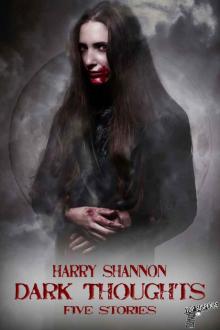 Dark Thoughts
Dark Thoughts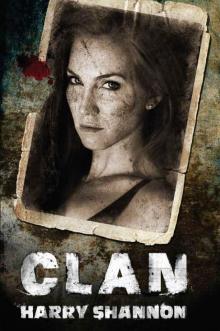 CLAN
CLAN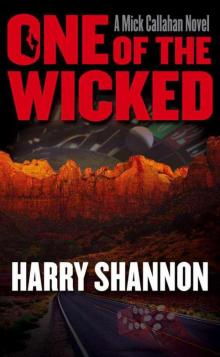 One of the Wicked: A Mick Callahan Novel
One of the Wicked: A Mick Callahan Novel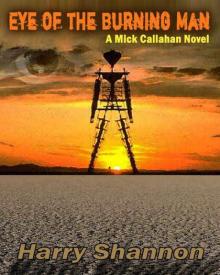 Eye of the Burning Man: A Mick Callahan Novel (The Mick Callahan Series)
Eye of the Burning Man: A Mick Callahan Novel (The Mick Callahan Series)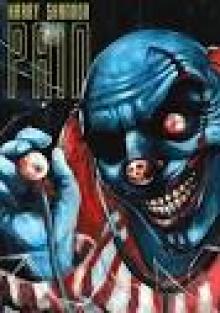 Pain
Pain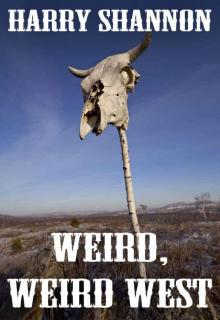 Weird, Weird West
Weird, Weird West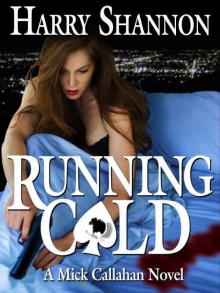 Running Cold (The Mick Callahan Novels)
Running Cold (The Mick Callahan Novels)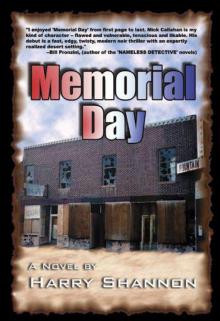 Memorial Day: A Mick Callahan Novel (The Mick Callahan Novels)
Memorial Day: A Mick Callahan Novel (The Mick Callahan Novels)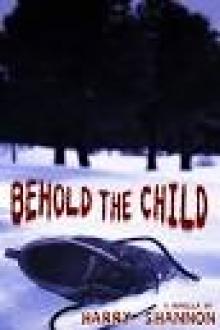 Behold the Child
Behold the Child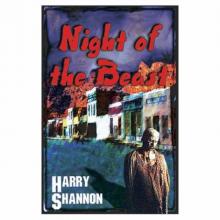 Night of the Beast
Night of the Beast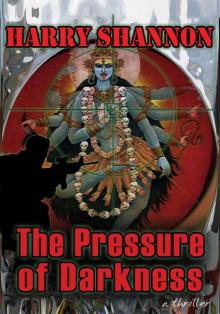 The Pressure of Darkness
The Pressure of Darkness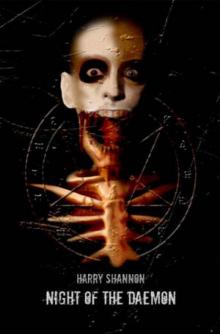 Daemon: Night of the Daemon
Daemon: Night of the Daemon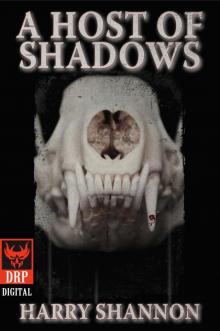 A Host of Shadows
A Host of Shadows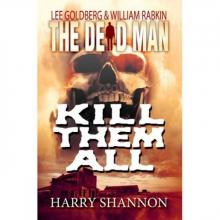 Kill Them All
Kill Them All